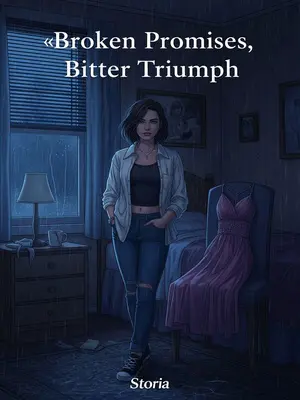Chapter 4: A Love Unseen
Later, a friend asked, what do you see in Mason? Just his looks?
She rolled her eyes, half-joking, half-concerned. "You could do better, Harper. He treats you like you’re invisible."
He treats you like this—why be so stubborn?
Why? Maybe because one rainy day, I saw him feeding stray cats outside the art building. He stood in the downpour, holding an umbrella, patiently coaxing a filthy kitten. Then he tucked the kitten inside his coat and carried it away.
He looked so gentle, so kind. I watched from the window, heart pounding. For a moment, I believed he could be gentle with me, too.
His profile was so gentle. I watched, dazed. Though I had an umbrella, it felt like the rain was falling straight into my heart.
I wanted to tell him, I'm a stray cat too—abandoned by my parents, growing up wandering.
I always felt like I didn’t belong anywhere. Maybe that’s why I clung to Mason so tightly. I wanted a place to call home.
He was so gentle to that kitten. Would he ever show me that gentleness?
But looking back, all his gentleness was for everyone but me.
He rescued kittens, helped classmates, volunteered at the shelter. But when it came to me, his heart was locked tight.
A week later, Mason returned. I'd lain on the couch for a week.
The apartment was quiet, the air stale. I watched the days pass from my spot on the sofa, waiting for something to change.
Strangely, even though he had a key, he kept knocking, as if someone would come open the door.
He stood outside for a long time, tapping his knuckles against the wood. Maybe he hoped I’d magically reappear.
When I was alive, whenever he came back from a trip, I'd wait by the door. If his flight was delayed, I'd sit on the stairs and run to hug him when he appeared.
I always wanted to be the first thing he saw when he got home. I thought it would make him happy.
Because I missed him every day we were apart.
I counted down the days, marked them on the calendar, planned special dinners. I wanted him to know he was loved.
He'd peel my hands from his neck, coldly saying, "Stop it."
He never liked public displays of affection. I tried to respect that, but sometimes I just wanted to hold him close.
I always prepared a big dinner, knowing his stomach was weak and he ate poorly on trips.
I’d make chicken soup, homemade bread, his favorite dumplings. I wanted to take care of him, to make him feel at home.
Maybe because no one opened the door, Mrs. O'Connor from next door poked her head out: "Mason, back from your trip? Don't knock, Harper isn't home. I haven't seen her for a week. Did you forget your key? She left a spare with me. Want it?"
Mrs. O’Connor was always looking out for us, always ready with a plate of cookies or a piece of gossip. She meant well.
After a while, I heard Mason's hoarse, low voice, squeezed from deep in his throat. "No need."
His voice was rough, barely audible. He sounded older, worn out. Tired in a way I’d never heard before.
He opened the door with his own key.
He stood in the doorway for a long time, like he was bracing himself for what he’d find.
Then he stood in the hallway, unmoving.
The air was thick with dust, the sunlight filtering through half-closed blinds. It felt like time had stopped.
He'd left in a hurry for his trip, the curtains drawn, the house dim. The bouquet of spray roses on the coffee table had withered. The place was a mess: a half-drunk mug of coffee, moldy apples, half-eaten chips, dust floating in the air.
Everything was just as I’d left it, only sadder. The flowers I bought on a whim were nothing but brittle stems now.
And my ashes, in a small funeral home box, next to the dead roses.
It was a pitiful sight—my whole life reduced to a cardboard box and a handful of dust.
When I was alive, the house was never so messy. This was our little home, and I cherished it, always keeping it neat and cozy.
I took pride in making our space warm and inviting. I wanted it to feel like a sanctuary, a place where we could both belong.
God knows how much we wanted a home.
We dreamed about it, talked about paint colors and furniture, imagined a future together. Now, it was just another empty apartment.
He stood there a long time before coming in and opening the curtains. My clothes were still drying on the balcony. He paused—just when I thought he'd throw them out, he took them down and placed them on the sofa, then started cleaning.
He moved slowly, methodically, folding my clothes with trembling hands. He wiped down the counters, swept the floor, trying to bring order to the chaos.
I'd never known a house could be so quiet, as if only breathing remained.
The silence was oppressive, broken only by the sound of his footsteps. I missed the hum of the washing machine, the clatter of dishes, the laughter we used to share.
After cleaning, he sat on the couch alone, exhausted.
He slumped back, rubbing his eyes. For a moment, he looked so lost, so vulnerable. I almost reached out to comfort him.
I looked him over carefully.
His suit hung loose on his frame, his hair unkempt, dark circles under his eyes. He looked like he hadn’t slept in days. Like he’d aged ten years overnight.
This trip really wore him out. He'd lost weight, his eyes were bloodshot, his beard unshaven.
He looked older, worn down by grief and guilt. It was a side of him I’d never seen before.
For someone so meticulous about his appearance, had things gone badly with Alexis?
Maybe their reunion wasn’t the fairy tale I’d imagined. Maybe she saw through his facade, too.
I wondered, then saw him take out a cigarette and start smoking.
He’d quit years ago, after his grandma died. I never thought I’d see him light up again. Not in this lifetime.
He'd quit long ago. I didn't know why he started again.
Maybe he was looking for comfort, or maybe he just wanted to feel something—anything.
He stared at the ceiling, eyes wide and empty, chain-smoking.
The smoke curled around him, filling the room with a bitter haze. He looked like a man waiting for a verdict. Waiting for something to break.
Then, for some reason, he drifted off, until the ash burned his palm and snapped him back. After a while, I saw his lips move.
He flinched, dropping the cigarette, and muttered something under his breath. I leaned closer, desperate to hear.
I leaned in and heard him whisper, "Harper."
It was barely audible, just a breath of sound. But it was my name, spoken with a tenderness I’d never heard before.
The name was so soft, I thought I imagined it. Maybe I did. Maybe I just wanted to believe.
For a moment, I let myself believe he missed me. That maybe, just maybe, he loved me after all.
A long time later, he stood up. Maybe from low blood sugar, he staggered, leaning on the wall before recovering.
He looked dizzy, unsteady on his feet. I wanted to help him, but all I could do was watch.
He went to the kitchen and opened the fridge.
The light flickered on, illuminating shelves full of spoiled food. The smell hit him, and he grimaced.
All the vegetables had rotted.
The lettuce was brown, the tomatoes shriveled. Everything I’d bought was long past its prime.
He opened the freezer—rows of homemade dumplings stacked inside.
Neatly labeled, carefully arranged, just the way I’d left them. I made sure he’d never go hungry, even when I was gone.
"Mason, what kind of dumplings do you like?"
I used to ask him that every week, hoping he’d show some enthusiasm. He never did, but I kept making them anyway. I couldn’t help myself.
"Don't order takeout when I'm not home, it's bad for your stomach."
He’d roll his eyes, but I knew he appreciated it. At least, I hoped he did.
"The freezer's full of dumplings I made for you."
I spent hours folding each one, thinking of him with every pinch and twist. It was my way of loving him.
"First row is cabbage and pork, second row shrimp and egg, third row chive and egg, remember?"
I organized them by flavor, labeled each bag with a marker. I wanted to make things easy for him.
"Hey, are you listening?"
He never was. But I kept talking anyway, filling the silence with my voice.
"Forget it, I'll write labels and stick them on."
He never noticed the little smiley faces I drew on the notes. But I kept drawing them, hoping they’d make him smile.
Mason stared at the dumplings, at my careful labels and the note to eat on time, with a smiley face.
He picked up one of the bags, tracing the letters with his thumb. For a moment, his face crumpled, and I thought he might actually cry.
Suddenly, his face turned ashen, his tall body curling up as if in unbearable pain. He clutched his chest tightly.
He sank to the floor, gasping for air, tears streaming down his face. The sound of his sobs filled the kitchen, raw and unfiltered.
I heard a wail tear from his throat.
It was the kind of grief that can’t be contained, the kind that rips you open from the inside. I wanted to hold him, to tell him it would be okay. But I couldn’t.
I once read that when a loved one dies, it's not the moment they leave that makes you grieve. It's the half carton of milk in the fridge, the pothos on the windowsill, the blanket folded on the bed, the washing machine humming at midnight.
It’s the little things that get you. The reminders that life goes on, even when you don’t want it to.
I wonder if Mason felt the same.
Maybe, for the first time, he understood what it meant to lose someone. Maybe, for the first time, he missed me.
Seven days after my death, he finally broke down in the home I could never return to, overwhelmed by grief.
It took a week, but the dam finally broke. All the pain he’d been holding in came rushing out.
How do I feel?













